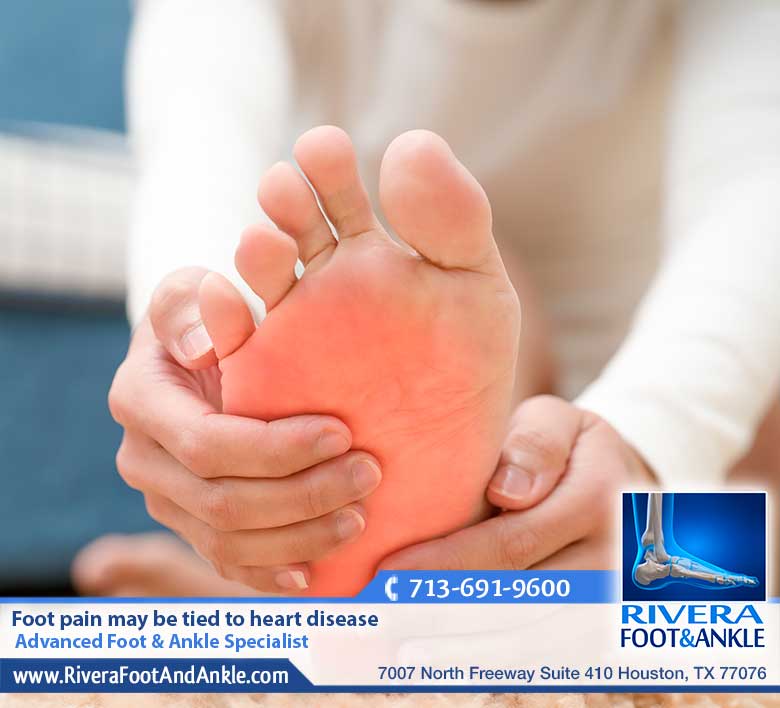
Advanced Foot & Ankle Specialist
Foot pain may be tied to heart disease
Your foot and leg pain can be related to heart disease. In honour of the many men and women who are diagnosed with heart disease, we thought we’d talk about the connection between the feet and heart.
Coronary artery disease is narrowing of the arteries in the heart where peripheral artery disease (PAD) is narrowing of the arteries in the extremities and feet. PAD is very common in people with coronary artery disease.
Hardened, narrowed arteries (atherosclerosis) are due to plaque buildup along the arterial wall. The plaque consists of fats, cholesterol, and other substances.
The more the buildup, the more blockage that occurs and in cases of inflammation of the plaque it can break off and cause complete blockage of blood flow.
When there is severe reduction in blood flow or complete blockage, there is tissue damage or death. In the heart, this is considered a heart attack. In the feet and legs, this can be limb-threatening where you are at risk of toe, foot or partial leg amputation.
Signs of PAD in the lower extremities or feet:
- Diminished or absent hair growth
- Dry, thin, atrophic skin
- Nail changes (thick, may be discolored, brittle)
- Pain and/or cramping in the feet and legs with walking, even short distances (symptoms usually resolve with rest but return with activity)
- Cold, numb feet and toes
- Slow healing wounds
- When you begin to have foot pain at rest, the PAD is advanced and more severe
The most common and simple way that we test for PAD is with an ankle/brachial index evaluation. This is a non-invasive test that uses blood pressure cuffs on the arms, legs, and feet to measure the arterial pressure of blood flow. The readings indicate whether there is reduced or blocked blood flow to the extremities.
It is very important to have your feet frequently examined by a podiatrist. Do not self-treat calluses, corns or other foot conditions. Referral to a vascular specialist is necessary with PAD as there may be the need for certain medications to avoid blood clotting around the plaque build-up and possible need for intervention to remove plaque and possible stent placement.
Ways to prevent or manage PAD:
- See your primary care specialist regularly, especially if you have a family history of coronary heart disease or PAD. This can allow early diagnosis and treatment of high blood pressure or high cholesterol as well.
- If you have been prescribed medication for high blood pressure or high cholesterol or medication to prevent clot formation such as aspirin or Plavix, then you need to be sure to take these as prescribed.
- Incorporate a healthy diet that is low in sodium and sugar. Eat more fresh fruit and vegetables.
- Exercise daily. It is recommended that you get 30 minutes of physical exercise at least five days a week.
- If you are a smoker, you need to quit smoking. Talk to your primary care physician about how you can safely quit.
If you are concerned that you may have PAD, please contact a podiatrist and have your feet checked by a specialist.
RIVERA FOOT & ANKLE: At Orlando H.Rivera DPM, our priority is to deliver quality care to informed patients in a comfortable and convenient setting. When you have problems with your feet, you need to turn to a podiatrist who listens and responds… an experienced doctor who knows the field and can effectively diagnose and treat your needs… a friendly physician who counsels you on the best ways to maintain and improve your health. Our physician(s) meet all these criteria. Plus, you benefit from a dedicated team of trained professionals who give you the individualized attention you deserve.

Advanced Foot & Ankle Specialist
Foot and Ankle, Dr. Orlando Rivera, Advanced Foot & Ankle Specialist, Foot and Ankle Podiatry, Houston Foot & Ankle Surgical, Treatment of Foot and Ankle, Foot & ankle specialists, Podiatrist in houston, podiatrist in houston, Orlando H.Rivera DPM, Houston Foot Doctor, Foot and Ankle Surgeon Houston, Ankle and Foot Specialist Houston, Podiatrist Houston, Foot Pain Houston.



